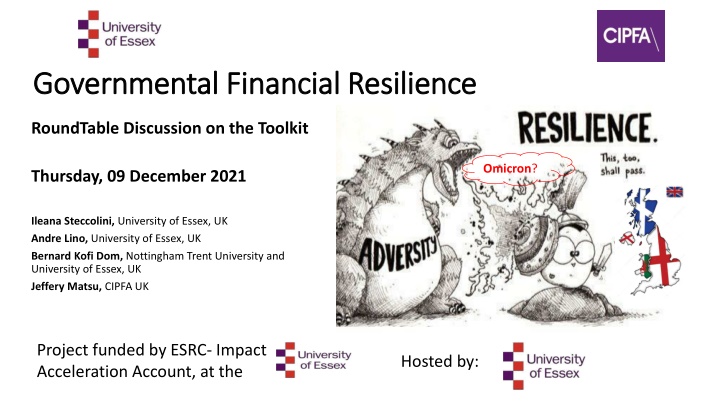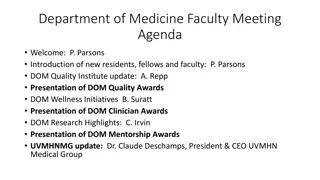
Financial Resilience Toolkit: Enhancing Governmental Financial Stability
Explore the Financial Resilience Toolkit designed for Local Governments to enhance financial stability and manage vulnerabilities during crises. Join the Roundtable Discussion on the toolkit's applications and development for future use. Discover tools and capabilities for identifying, interpreting, and managing financial shocks effectively.
Download Presentation

Please find below an Image/Link to download the presentation.
The content on the website is provided AS IS for your information and personal use only. It may not be sold, licensed, or shared on other websites without obtaining consent from the author. If you encounter any issues during the download, it is possible that the publisher has removed the file from their server.
You are allowed to download the files provided on this website for personal or commercial use, subject to the condition that they are used lawfully. All files are the property of their respective owners.
The content on the website is provided AS IS for your information and personal use only. It may not be sold, licensed, or shared on other websites without obtaining consent from the author.
E N D
Presentation Transcript
Governmental Governmental Financial Financial Resilience Resilience RoundTable Discussion on the Toolkit Omicron? Thursday, 09 December 2021 Ileana Steccolini, University of Essex, UK Andre Lino, University of Essex, UK Bernard Kofi Dom, Nottingham Trent University and University of Essex, UK Jeffery Matsu, CIPFA UK Project funded by ESRC- Impact Acceleration Account, at the Hosted by:
Agenda Agenda Welcome & Introductions (5 mins) The Financial Resilience Model A short Review (15 mins) The Financial Resilience Toolkit (10 mins) Responding to the Toolkit (10 mins) Discussions (45 mins) oHow would you use this Toolkit in your Local Government (Organisation)? oHow would you adapt this toolkit in making decision from a UK LG context? oNext Steps: Developing the Toolkit How can we develop this toolkit to be used in future? Would you be interested to or know someone who d participate in testing the Toolkit in your Organisation/in other organisations? Closing remarks (5 mins) 2
The conceptual model on financial resilience The conceptual model on financial resilience Tools and capabilities to (better) identify and manage vulnerabilities and to recognize shocks in advance Scanning (awareness) and interpretation of the crisis (threat, opportunity) Staff s emotional reaction and mental framing Retrospective interpretation (perception of controllability, powerlessness, and dependence on decisions by others) Prospective interpretation (estimate of the organization s future condition and possible sources of negative impact) Tools and capabilities to understand the nature, likelihood, timing, scale and potential impact of shocks Anticipatory Capacities Sensemaking Financial Shock Financial Shock Vulnerability Patterns of Resilience Perceived level of exposure to external shocks that may affect organizazional finances Resources and abilities that enable local governments to face shocks and manage their vulnerabilities Coping Capacities External and internal factors contributing to the level of vulnerability These capacities lie dormant in times of order and become visible in times of disruption (shock) through coping strategies Adapted from Carmela Barbera, Martin Jones, Sanja Korac, Iris Saliterer, Ileana Steccolini, Governmental financial resilience under austerity in Austria, England and Italy: How do local governments cope with financial shocks? , Public Administration, DOI: 10.1111/padm.12350 Three main types of CCs: Buffering, Adapting, Transforming 3
Responding Responding to to crises and and capacities capacities Bouncing back crises, , patterns patterns of of resilience resilience Bouncing forward Bouncing forward changed the way it delivers services changed the priorities of traditional activities changed its internal structure extended its existing services established new services Bouncing back reduced existing services deferred/reduced investments increased fees and charges for services liquidated assets in order to raise capital eliminated some services 4
Why Why does does Governmental Governmental Financial Financial Resilience Resilience matter? matter? Higher financial vulnerability encourages bouncing back strategies and discourages bouncing forward strategies Bouncing back Vulnerability Bouncing forward Anticipatory capacities (especially information exchange) encourage bouncing forward strategies, and have no association with bouncing back strategies Bouncing back Anticipatory Capacities Bouncing forward Barbera et al 2019, https://journals.sagepub.com/eprint/FFZPNHMNTV7ZGYVKV3Z5/full Barbera et al 2018, Local government financial resilience: Germany, Italy and UK compared, CIMA executive report www.cimaglobal.com/FinancialResilienceToolkit
The relevance of capacities for resilience for government performance Perceived Financial vulnerability makes a difference in financial performance Some anticipatory and coping capacities affect financial performance (monitoring, info sharing, rapidity of action) Anticipatory and coping capacities make a difference for non-financial performance Vulnerability Anticipatory Capacities Financial Performance Coping Capacities Anticipatory Capacities Non-financial Performance Coping Capacities Barbera et al 2019, https://journals.sagepub.com/eprint/FFZPNHMNTV7ZGYVKV3Z5/full Barbera et al 2018, Local government financial resilience: Germany, Italy and UK compared, CIMA executive report www.cimaglobal.com/FinancialResilienceToolkit
The Financial Resilience Toolkit The Financial Resilience Toolkit Translating the findings of our research (and our framework) into a tool to be used as a support for Assessing anticipatory and coping capacities, and perceived vulnerability Identifying possible critical areas or strengths Anticipatory Capacities Vulnerability Financial resilience Financial resilience Coping Capacities 7
Completing the Toolkit Completing the Toolkit Please click the link in the chatbox to complete the Financial Resilience Toolkit Please bear the following discussion points in mind whilst completing the Toolkit. Useability of the Toolkit by LG practitioners Adaptability of the Toolkit in decision making to stay resilient and less vulnerable (Possible) Next steps of the current version of this Toolkit 8
Discussion Discussion - - Broad Broad Theme Theme 1: 1: Useability Useability How would you adapt this toolkit in making decision from a UK LG context? Vulnerability In an LG context, who is this likely to be most useful to? Anticipatory Capacities Sensemaking How will you expect them to use it? Different patterns of Financial resilience What other similar tools are used to measure financial resilience in your organisation? Coping Capacities Carmela Barbera, Martin Jones, Sanja Korac, Iris Saliterer, Ileana Steccolini, 2018, Local government financial resilience: Germany, Italy and UK compared, CIMA executive report www.cimaglobal.com/FinancialResilienceToolkit 9
Discussion Discussion - - Broad Broad Theme Theme 2: 2: Adaptability Adaptability How would you adapt this toolkit in making decision from a UK LG context? Vulnerability Anticipatory Capacities Local Governments Sensemaking Policy makers (including CIPFA, LGA) Different patterns of Financial resilience Government Coping Capacities Carmela Barbera, Martin Jones, Sanja Korac, Iris Saliterer, Ileana Steccolini, 2018, Local government financial resilience: Germany, Italy and UK compared, CIMA executive report www.cimaglobal.com/FinancialResilienceToolkit 10
Discussion Discussion - - Broad How can we work on this in the future? Broad Theme Theme 3: Next Steps 3: Next Steps Are you interested in continuing this conversation? (How) would you like to be involved? A control room for developing the toolkit further? Next meetings? Providing feedbacks and inputs in developing the toolkit further Anticipatory Capacities Vulnerability Sensemaking Different patterns of Financial resilience Coping Capacities






















